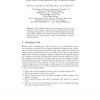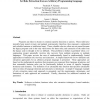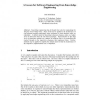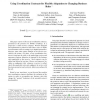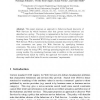ECOOPW
1998
Springer
14 years 3 months ago
1998
Springer
This workshop focussed on the requirements for tools and environments that support business rules in an object-oriented setting and attempted to provide an overview of possible tec...
TOOLS
1999
IEEE
14 years 3 months ago
1999
IEEE
Business rules are closely associated with events. This paper describes how events in use cases can be the basis for identifying classes and business rules. A process known as Eve...
ECOOPW
2000
Springer
14 years 3 months ago
2000
Springer
Abstract. The unrelenting pace of change that confronts contemporary software developers compels them to make their applications more configurable, flexible, and adaptable. A way t...
ER
2001
Springer
14 years 4 months ago
2001
Springer
Business rules are statements that express (certain parts of) a business policy, defining business terms and defining or constraining the operations of an enterprise, in a declar...
COMPSAC
2002
IEEE
14 years 4 months ago
2002
IEEE
Programs use rules to dictate or constrain specific decisions or actions. These rules have typically been tested, revised, and updated continuously; therefore, they represent a su...
DEXA
2003
Springer
14 years 4 months ago
2003
Springer
Knowledge engineering has developed fine tools for maintaining the integrity of knowledge bases. These tools may be applied to the maintenance of conventional programs particularly...
IWPSE
2003
IEEE
14 years 4 months ago
2003
IEEE
This paper reports on the use of coordination contracts, presented at the previous two IWPSE workshops, in a project for a credit recovery company. We have designed and implemente...
ICEIS
2003
IEEE
14 years 4 months ago
2003
IEEE
: True integration of large systems requires sharing of information stored in databases beyond sharing of pure data: business rules associated with this data must be shared also. T...
INTELLCOMM
2004
Springer
14 years 4 months ago
2004
Springer
This paper proposes an approach to behaviour-based discovery of Web Services by which business rules that govern service behaviour are described as a policy. The policy is represen...
ICSOC
2004
Springer
14 years 4 months ago
2004
Springer
Over the last few years several process-based web service composition languages have emerged, such as BPEL4WS and BPML. These languages define the composition on the basis of a pr...
